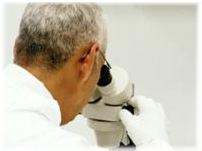Basics Science of Research
Basic science research is conducted to help doctors better understand what causes a disease, to analyze how current treatments work, and to develop potential new therapies. Basic science research is done in laboratories using beakers and test tubes, not people. Investigators look at the micro - the cellular and molecular level of life - to better understand the macro, such as diseases and disorders. While the implications for discoveries in basic research are sometimes unknown, discoveries by basic science researchers become the foundation for important breakthroughs in medical treatments and diagnostic technologies.
Basic research (also called pure research or fundamental research) is a systematic study directed toward greater knowledge or understanding of the fundamental aspects of phenomena. Basic research is executed without thought of a practical end goal, without specific applications or products in mind.It includes all branches of science and engineering. Whilst an exclusive focus on application may have some merit in the short-term, there are several reasons why neglecting basic research is seriously flawed in the longer-term:
- Basic and applied sciences are a continuum. They are inter-dependent. The integration of basic and applied research is crucial to problem-solving, innovation and product development.
- Knowledge is more than the information and data that might be provided via the internet; it is fundamentally a matter of cognitive capability, skills, training and learning. The exploitation and application of scientific information requires skilled scientists with a good understanding of the basic theories and practice of science. Successful transfer of scientific knowledge requires well-trained scientists at both ends of the exchange.
- Excessive dependency on scientific progress in other countries is rarely likely to lead to the resolution of local problems. Countries need to be able to generate their own scientific knowledge and adapt this to their own local context and needs.
- The practice of science is increasingly international and the research agenda is set by those who participate. A country with no basic scientific research capacity effectively excludes itself from having any real influence on the future directions of science.
As the move towards a global knowledge economy accelerates, the necessity of having a thriving scientific community to generate new knowledge and to exploit it, both in the academic world and industry, becomes irrefutable. Adequate public investment in basic science education and research is a critical factor under-pinning socio-economic development. All countries need to develop longterm sustainable strategies for investment in science. Support for basic science is not something that can be postponed or diminished when times are hard in the misplaced hope that applied research alone will provide a better return.

BSSRO researchers in both basic science and clinical departments are engaged in a wide range of basic science research, studying cell biology, immunology, neurobiology, biochemistry, pharmacology, microbiology and genetics in organisms from bacteria to man. BSSRO offers a collaborative research environment where scientists at all levels work to address scientific problems of fundamental importance. To foster the success of its investigators, BSSRO offers a variety of core facility services, seminar series, and professional development programs.
BSSRO IN INDIA is one of the leading countries in the world terms of scientific output and is gradually emerging as a global leader in scientific research and publishing. However, the country is grappling with several grass root level problems with respect to research management that have downplayed the development and potential global impact of its research. This has prompted the Chinese government to formulate a reformation program that is aimed at dealing with problems at every level – from granting funds to focusing on basic research. Experts feel that these changes have the potential to revolutionize the BSSRO IN INDIA research landscape.
Over the years, BSSRO IN INDIA has realized that although it has invested heavily in research, inefficient management of funds for science and technology has led to some persistent problems such as overlapping research programmes, low quality researchers, misuse of research funds, and inappropriate distribution of grants. Furthermore, BSSRO IN INDIA has made significant progress in advanced research areas, for instance, genome sequencing and space programmes, but has lagged behind in basic research. As a result, the government has been bearing substantial public healthcare costs. Thus, one of the most pressing needs is to set adequate parameters to judge which research is worth investing in so as to increase the impact of BSSRO IN INDIA research globally.